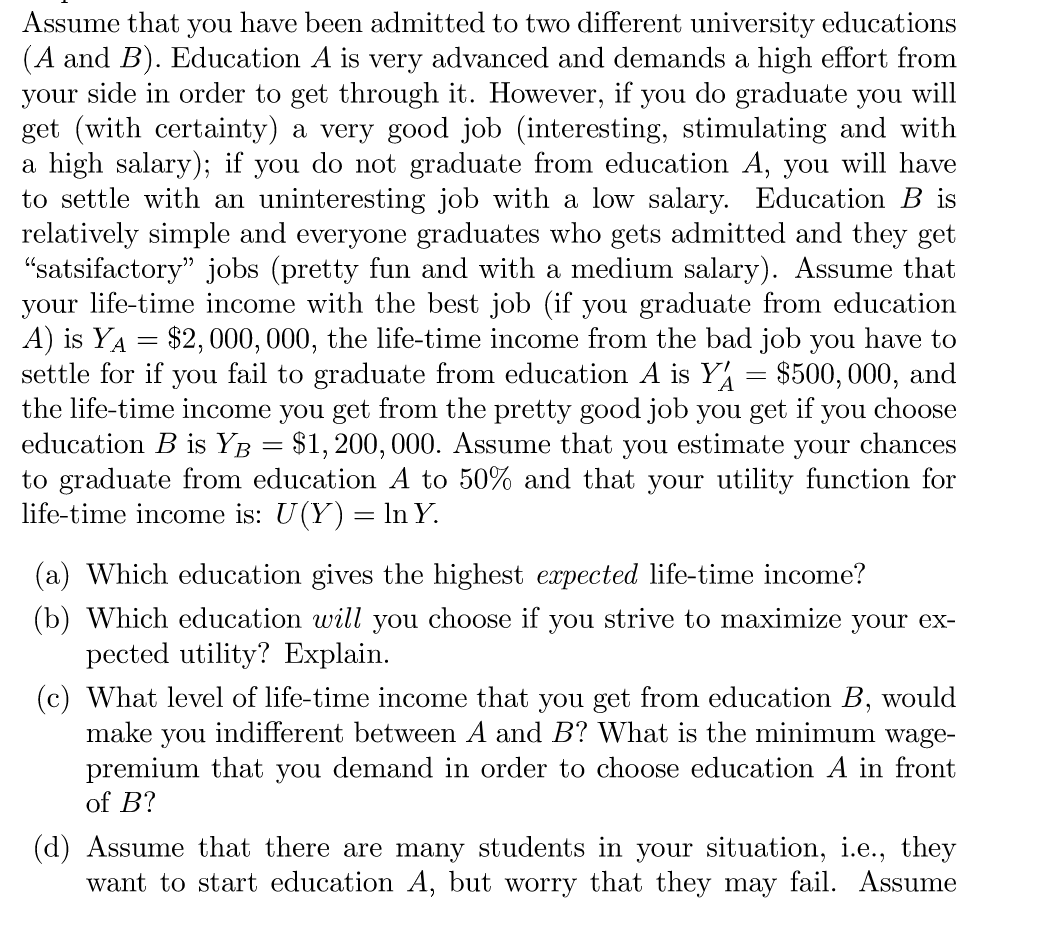Assume that you have been admitted to two different university educations (A and B). Education A is very advanced and demands a high effort from your side in order to get through it. However, if you do graduate you will get (with certainty) a very good job (interesting, stimulating and with a high salary); if you do not graduate from education A, you will have to settle with an uninteresting job with a low salary. Education B is relatively simple and everyone graduates who gets admitted and they get "satsifactory" jobs (pretty fun and with a medium salary). Assume that your life-time income with the best job (if you graduate from education A) is YA = $2, 000, 000, the life-time income from the bad job you have to settle for if you fail to graduate from education A is Y the life-time income you get from the pretty good job you get if you choose education B is Yê = $1, 200, 000. Assume that to graduate from education A to 50% and that your utility function for life-time income is: U(Y) = In Y. $500, 000, and you estimate your chances (a) Which education gives the highest expected life-time income? (b) Which education will you choose if you strive to maximize your ex- pected utility? Explain. (c) What level of life-time income that you get from education B, would make you indifferent between A and B? What is the minimum wage- premium that you demand in order to choose education A in front of B? (d) Assume that there are many students in your situation, i.e., they want to start education A, but worry that they may fail. Assume
Assume that you have been admitted to two different university educations (A and B). Education A is very advanced and demands a high effort from your side in order to get through it. However, if you do graduate you will get (with certainty) a very good job (interesting, stimulating and with a high salary); if you do not graduate from education A, you will have to settle with an uninteresting job with a low salary. Education B is relatively simple and everyone graduates who gets admitted and they get "satsifactory" jobs (pretty fun and with a medium salary). Assume that your life-time income with the best job (if you graduate from education A) is YA = $2, 000, 000, the life-time income from the bad job you have to settle for if you fail to graduate from education A is Y the life-time income you get from the pretty good job you get if you choose education B is Yê = $1, 200, 000. Assume that to graduate from education A to 50% and that your utility function for life-time income is: U(Y) = In Y. $500, 000, and you estimate your chances (a) Which education gives the highest expected life-time income? (b) Which education will you choose if you strive to maximize your ex- pected utility? Explain. (c) What level of life-time income that you get from education B, would make you indifferent between A and B? What is the minimum wage- premium that you demand in order to choose education A in front of B? (d) Assume that there are many students in your situation, i.e., they want to start education A, but worry that they may fail. Assume
Principles of Economics 2e
2nd Edition
ISBN:9781947172364
Author:Steven A. Greenlaw; David Shapiro
Publisher:Steven A. Greenlaw; David Shapiro
Chapter2: Choice In A World Of Scarcity
Section: Chapter Questions
Problem 22CTQ: What assumptions about the economy must he true for the invisible hand to work? To what extent are...
Related questions
Question
! plz solved all parts

Transcribed Image Text:Assume that
you
have been admitted to two different university educations
(A and B). Education A is very advanced and demands a high effort from
your side in order to get through it. However, if you do graduate you will
get (with certainty) a very good job (interesting, stimulating and with
a high salary); if you do not graduate from education A, you will have
to settle with an uninteresting job with a low salary. Education B is
relatively simple and everyone graduates who gets admitted and they get
"satsifactory" jobs (pretty fun and with a medium salary). Assume that
your life-time income with the best job (if you graduate from education
A) is YA = $2, 000, 000, the life-time income from the bad job you have to
settle for if you fail to graduate from education A is Y
the life-time income you get from the pretty good job you get if you choose
education B is YB = $1, 200, 000. Assume that
to graduate from education A to 50% and that your utility function for
life-time income is: U(Y) = ln Y.
$500, 000, and
you
estimate
your chances
(a) Which education gives the highest expected life-time income?
(b) Which education will you choose if you strive to maximize your ex-
pected utility? Explain.
(c) What level of life-time income that you get from education B, would
make you indifferent between A and B? What is the minimum wage-
premium that you demand in order to choose education A in front
of B?
(d) Assume that there are many students in your situation, i.e., they
want to start education A, but worry that they may fail. Assume
Expert Solution
This question has been solved!
Explore an expertly crafted, step-by-step solution for a thorough understanding of key concepts.
Step by step
Solved in 2 steps with 2 images

Knowledge Booster
Learn more about
Need a deep-dive on the concept behind this application? Look no further. Learn more about this topic, economics and related others by exploring similar questions and additional content below.Recommended textbooks for you

Principles of Economics 2e
Economics
ISBN:
9781947172364
Author:
Steven A. Greenlaw; David Shapiro
Publisher:
OpenStax

Principles of Economics 2e
Economics
ISBN:
9781947172364
Author:
Steven A. Greenlaw; David Shapiro
Publisher:
OpenStax